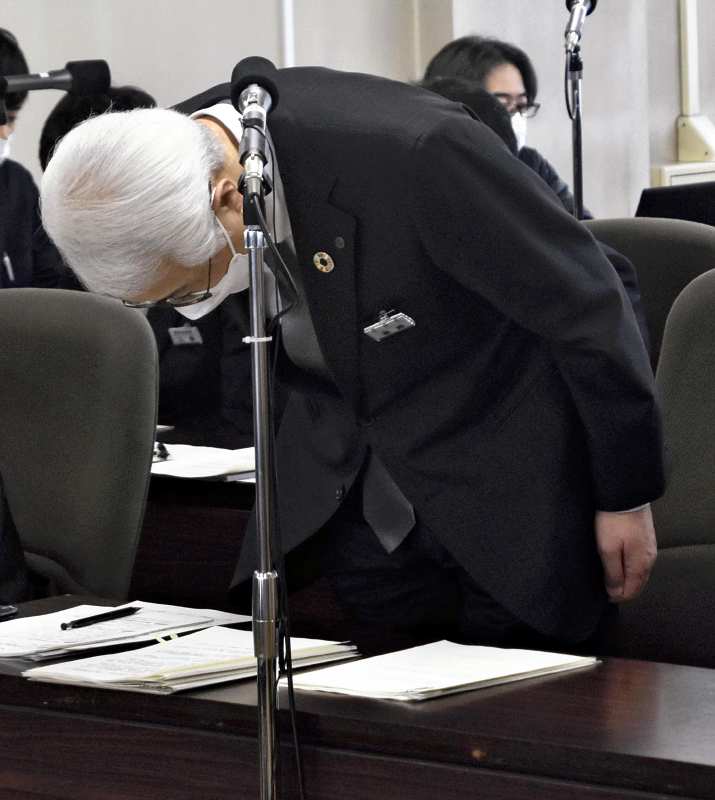Cozy ties between schools, former educators undermining bullying probes in Japan

Shinichi Kurowarabi, head of Asahikawa’s board of education, apologizes for the inadequate handling of a bullying case in Asahikawa, Hokkaido, in April.
1:00 JST, September 29, 2022
Concerns have been raised over school boards that rely solely on teachers to investigate cases of bullying, following instances in which mistakes have been acknowledged by authorities.
There are said to be multiple cases in which boards of education have failed to take appropriate action to deal with bullying or denied that bullying has occurred at all. Relationships among investigators and schools involved in such cases, and the lack of third-party opinions, have been cited as possible causes.
More than half the boards of education in Japan’s major cities assign teams comprising former teachers to investigate cases of bullying, a recent Yomiuri Shimbun survey has found.
The survey was conducted from May to July on 109 municipalities, comprising prefectural capital cities, Tokyo’s 23 wards and other big cities. All 109 municipalities responded to the survey, in which they were asked for details about officials investigating cases of bullying as of April 1.
The survey found that many boards appoint about 10 officials to look into bullying issues. Investigators were drawn solely from the ranks of former teachers in 58 of the municipalities, or 53.2%.
In answer to a question asking why former teachers are assigned to handle bullying issues when most education board officials are not teachers, 99.1% selected, “Former teachers know what it’s like in schools and classrooms and it’s expected that they can provide appropriate guidance.”
“Former teachers can respond at schools as soon as a bullying-related incident occurs,” was selected by 78.9%. Multiple answers were allowed.
However, 15 municipalities, or 13.8%, said there are “disadvantages” to assigning former teachers to deal with bullying-related issues. Of them, six said they assign administrative staff or counselors familiar with laws and regulations, in addition to former teachers.
Under the Law for the Promotion of Measures to Prevent Bullying, school bullying is deemed to be a “serious issue” if there is a possibility it has caused serious physical or mental damage to a child, or to their property, or if the situation forced the child to be absent from school for a considerable period.
If such situations arise, the law requires schools and boards of education to set up an investigation team. However, in many cases, the situation worsens when a board of education fails to respond appropriately.
A second-year junior high school student in Asahikawa, Hokkaido, who was found frozen to death last March, suffered from bullying and had called the school saying she wanted to die. However, the school concluded the student’s experience did not constitute bullying and the city’s board of education did not investigate the case. The 12 board of education officials in charge of the case were former teachers.
Following the student’s death, the board acknowledged its response had fallen short and apologized to her family. A third-party committee that probed the case compiled its final report this month, saying, “The city’s board of education should have been actively involved in the case.”
In many cases, schools and teachers are reportedly reluctant to admit bullying has taken place over fears of being held accountable. A sense of camaraderie often hinders former teachers from solving related problems, too.
In a 2012 case involving the Osaka municipal Sakuranomiya High School in which a student committed suicide after being physically abused by staff, a report compiled by the city’s external inspection team slammed the close ties between the city’s board of education and the school and its teachers.
Upon receiving a report about the corporal punishment doled out at the school, the guidance chief of the city’s board of education — a former teacher — asked the school to cooperate in the investigation, but the principal reportedly raised his voice and refused, causing the chief to back down and refrain from issuing strict guidance. Officials of the high school’s education guidance department, to which the chief belonged, were all former teachers.
Some local governments have expedited the establishment of separate organizations to investigate bullying in an attempt to counter slow responses by education boards due to their ties with the schools in question.
In 2019, the Neyagawa city government in Osaka Prefecture established an inspection division within the mayoral department. The city government acknowledged 183 cases of bullying in fiscal 2021. In each case, the bullying reportedly stopped within a month.
The Kani city government in Gifu Prefecture established a committee within the mayor’s department in 2012 in response to reports of bullying at a municipal junior high school. The city government also dispatches clinical psychologists and lawyers to provide advice to schools.
Next fiscal year, Hokkaido’s Asahikawa city government plans to establish a section within the mayor’s department that will be tasked with formulating bullying-prevention measures, learning from the examples of Neyagawa and other cities.




